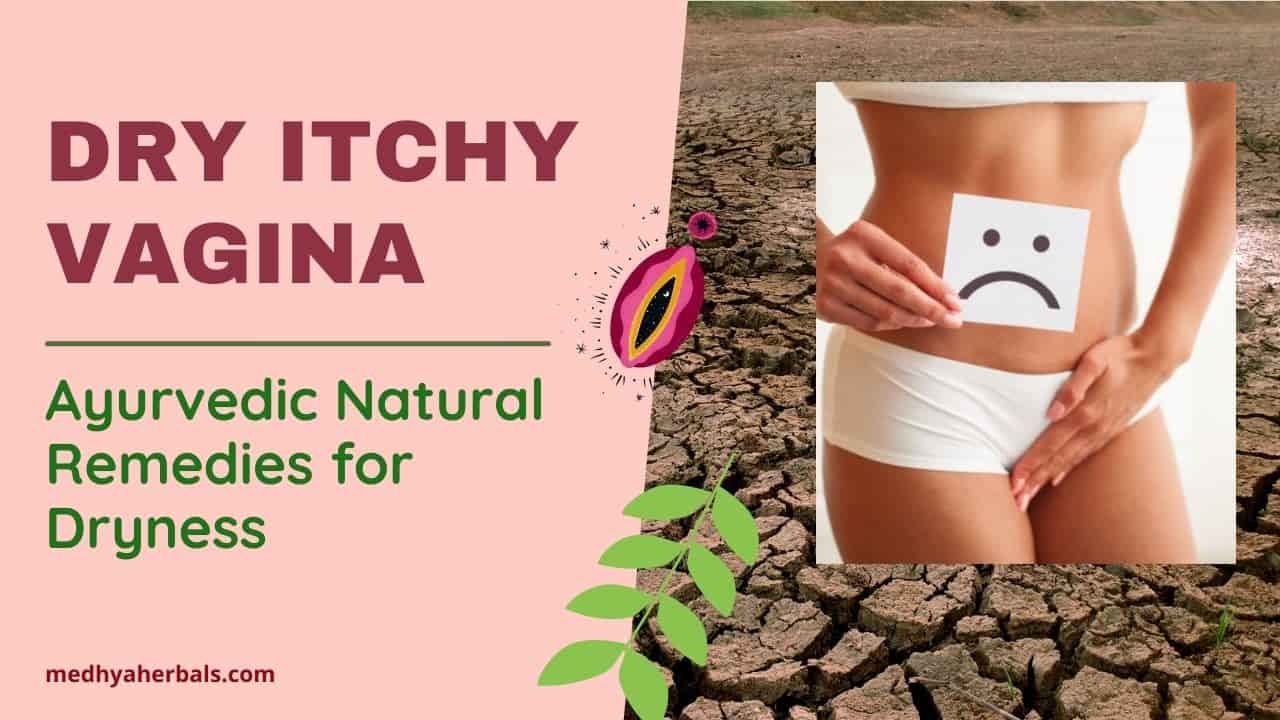Vaginal dryness, dry and itchy vagina and painful sexual intercourse are some of the not so discussed struggles of women. And it is not because vaginal dryness is uncommon!
In fact a woman is prone to dryness down there during and after menopause, right after pregnancy, after major surgery of hysterectomy and perhaps at any time in her life.
It is estimated that more than 50% of the menopausal women experience symptoms of dry and itchy vagina.
Since the discomforts of dry vagina affect majority of the women at multiple stages of their life, it definitely shouldn’t be dealt with in silence.
In this post we will go through the causes, symptoms and Ayurvedic natural remedies for vaginal dryness that you can practice to keep your vagina healthy and happy.
What is Vaginal Dryness?
Vaginal dryness is a common condition that can affect women of all ages, and is characterized by dry, itchy, and uncomfortable sensations in the vagina.
The vagina produces various fluids that keep it healthy and lubricated. One of such vaginal secretion to keep the vagina moist happens under the action of Estrogen, which is normally produced during various phases of the menstrual cycle.
Thus, sufficient estrogen level are essential to stimulate the mucous membranes of the vagina and keep the tissues in the vaginal wall thick and supple.
However, with menopause or due to hormonal imbalances, estrogen level goes down in a woman’s body. This leads to observed symptoms such as pain, dry skin, tightening and dryness.
Vaginal Atrophy in Menopause
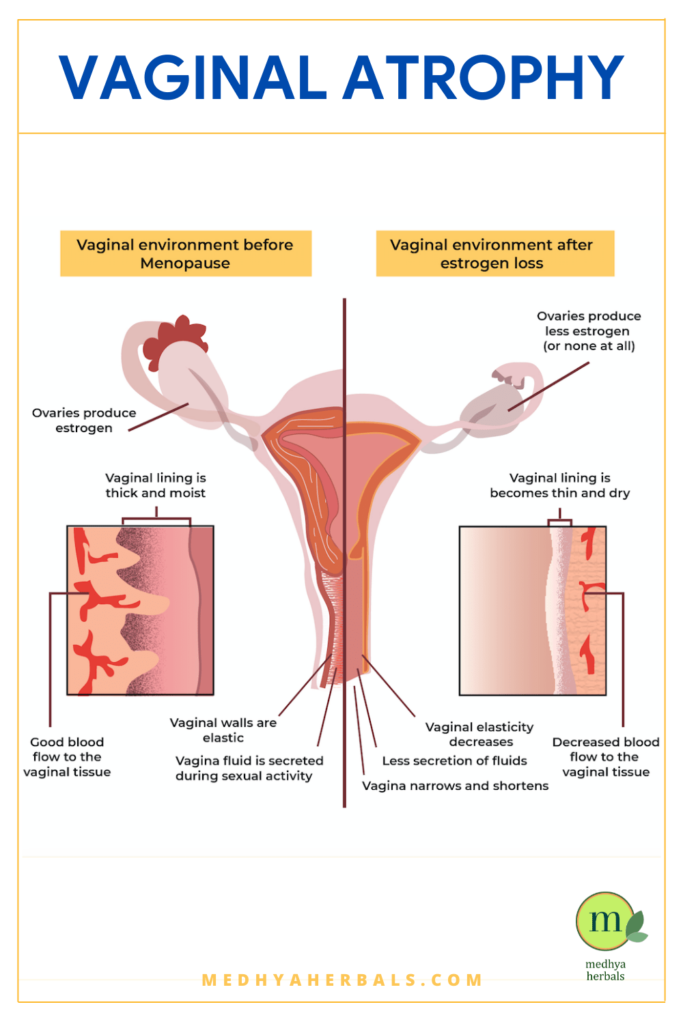
Some of the symptoms of vaginal dryness are also part of the symptoms of vaginal atrophy (loss of vaginal tissue and moisture). These are thus referred to as Genitourinary Symptoms of Menopause (GSM).
Symptoms of Vaginal Dryness
Listed below are some symptoms of vaginal dryness that women may encounter.
- Painful sexual intercourse: Due to the dryness, there is less lubrication. Consequently, there is tremendous friction during intercourse, which causes pain
- Loss of interest in sex or sexual dysfunction: This is both due to lower levels of estrogen, leading to a lower sexual drive. Also, painful experience during sex can lead to loss of further interest in it
- Light bleeding can also be observed following intercourse due to the friction. This friction can cause tissues to tear and bleed
- Vaginal swelling, soreness and inflammation of vaginal wall
- Recurrent urinary tract infection
- Vaginal Infection
- Vaginal itching or stinging
- Burning sensation inside the vagina especially at the vulva
- Weak vaginal muscles leading to urinary intcontinence. This is part of vaginal atrophy symptoms
- Excess Vaginal Discharge
Aside the loss of moisture, there is also loss of elasticity of the vaginal tissue, resulting in vaginal atrophy.
Menopausal imbalances usually result in vaginal problems in all stages of menopause. However, other health conditions that lead to a drop in estrogen level or affect normal production of estrogen can also result in vaginal dryness.
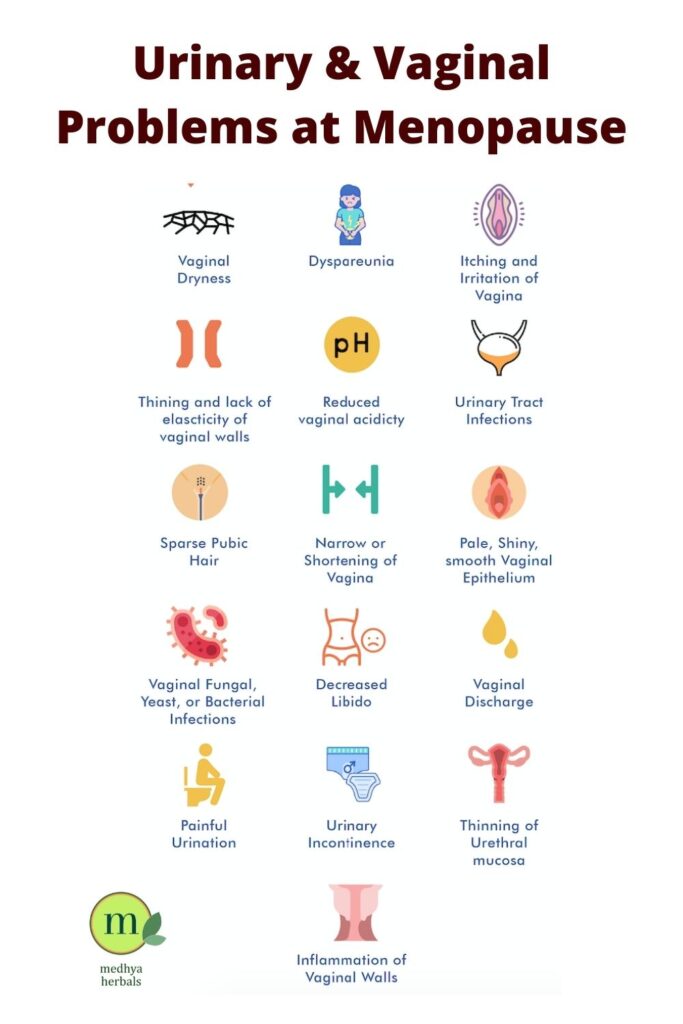
What Causes Vaginal Dryness?
Dryness of the vagina is a sign of natural aging process, when your Estrogen levels drop down.
Estrogen hormone encourages the vaginal tissue to keep the vagina moist and provides sufficient nourishment to the vaginal cells to keep them intact.
Thus, a reduction in Estrogen level not only dries up the vaginal canal but it also thins down the vaginal wall due to loss of vaginal tissue.
That’s why any other factor that drops estrogen level can also lead to dryness of the vagina. Here are some of the causes that affect your hormone balance and levels of moisture to the vagina:
Taking Care of a Dry and Itchy Vagina
There are several steps that you can take to prevent and heal a dry and itchy vagina. Both conventional western medicine and the Ayurvedic medicine also have their own approaches.
Conventional Approaches to Tackling Dryness of Vagina
To cure vaginal dryness, a common approach is to apply estrogen creams on the affected area. This can be done in several ways:
- Vaginal Ring: vaginal ring is a flexible system that is inserted into the vagina. It releases small amounts of estrogen over time. This helps to restore the estrogen levels in the body. It is replaced after 90 days.
- Vaginal Cream: It is applied directly on the skin. It also supplements the estrogen.
- Vaginal Tablet: It is a pill inserted into the vagina and also intended to boost estrogen level.
- Nutritional therapy involving vitamin d, collagen and healthy fats
Ayurveda and Dryness of the Vagina
In Ayurveda, health conditions are traced down to an imbalance in either of the three doshas, namely Vata (air & space), Pitta (fire & water) and Kapha (earth & water) doshas.
Vaginal dryness is referred to as suska yoni (dry reproductive organs) in Ayurveda. It happens due to an imbalance in the apana vata dosha.
Since, vata dosha becomes more dominant with increasing age. This, thus accounts for the higher incidence of vaginal dryness in postmenopausal women.
In fact, not only vaginal, but there is also observed dryness of their skin and scalp too, which leads to skin wrinkling and other health complications.
Ayurvedic Treatment for Vaginal Dryness
Ayurvedic approach to treat suska yoni or dryness of vagina is all natural and holistic in nature. Ayurvedic treatment for vaginal dryness involves herbal therapies, nourishing diet and a healthy lifestyle that will help you to combat the root cause of dryness through out the body.
All the herbs and formulations that have been shared in this post are for information purpose only. All of these are potent Ayurvedic medicines that should be taken under the supervision of a qualified Ayurvedic doctor only. Do not indiscriminately use Ayurvedic herbs. It may cause more harm than benefit.
Also, Ayurveda is known for its uniqueness to tailor treatment specifically to individuals according to there specific health symptoms and body type.
Ayurvedic Herbs and Natural Remedies to Increase Lubrication
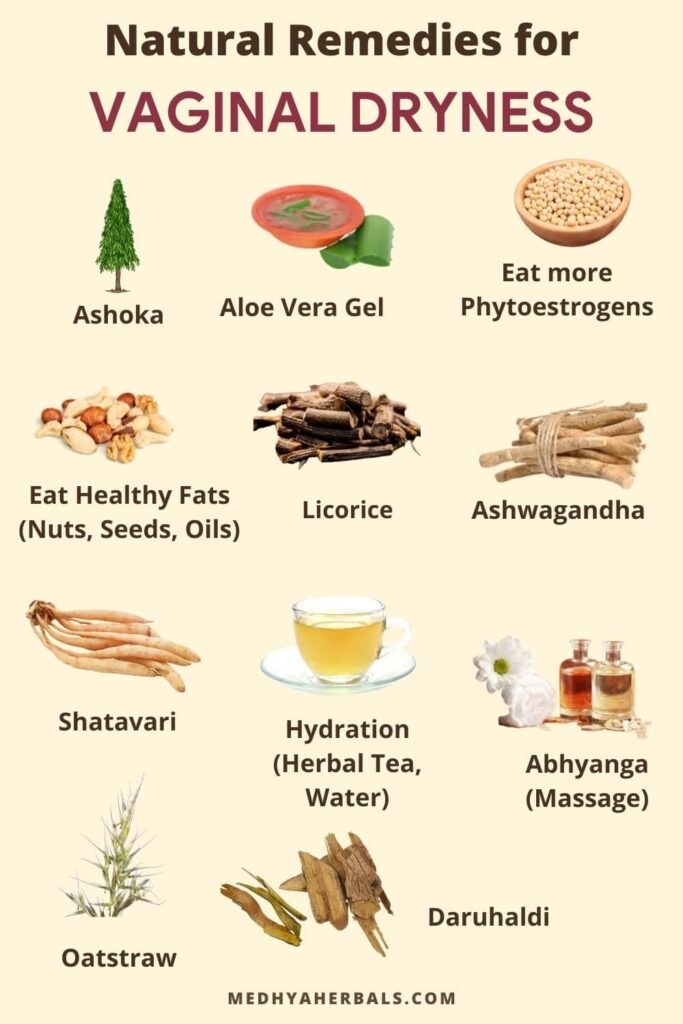
Ashoka
This ayurvedic herb for curing vaginal dryness is known to balance female hormones, and thus can be highly effective for symptoms of menopausal syndrome.
It is also known to strengthen the uterus membrane and urinary tract.
Aloe vera gel
This is a good natural vaginal lubricant. It is also good for the reproductive health. It can be taken with winter cherry and saffron added to a glass of milk at night, just before bed. You can also mix rose water and aloe vera gel and apply it on the vagina.
Daruhaldi
Daruhaldi contains vitamin C, tannins, pectins, and other minerals that include potassium, calcium, magnesium, iron, etc. This is an excellent healing and blood purifying herb.
Daruhaldi is also highly effective to treat other menopausal symptoms as heavy menstrual bleeding.
Oat Straw
This reduces stress, anxiety, and blood sugar levels. It also boosts vaginal lubrication.
Ashwagandha
Ashwagandha is a well known Ayurvedic herb as it is useful for a wide spectrum of conditions, including menopause. In this case, it helps to keep the vaginal walls healthy and supple. It prevents pain and tearing due to tightening and dryness. As a bonus, it also helps relieve hot flushes, moodiness and insomnia.
Shatavari
Ghee medicated with shatavari, applied locally, enhances lubrication.
Fenugreek
Fenugreek seeds produce an estrogen like effect and help to increase vaginal lubrication. Soak a teaspoon of fenugreek seeds in water overnight. Drink the water in the morning.
Sesame Oil
It is quite effective as a natural vaginal lubricant. Dip a ball of cotton in sesame oil and apply it to the vaginal walls. Do this 2-3 times a week after shower or before you sleep.
Coconut oil
It can restore the natural lubrication of the vagina. Dip a ball of cotton in coconut oil and apply it to the vaginal walls to hydrate and lubricate the affected area.
Abhyangha
Practice regular massage with sesame oil (for predominant vata dosha or imbalance), coconut oil (for predominant pitta dosha or imbalance) and mustard oil (for predominant kapha imbalance and dosha).
Natural Remedies
Other methods including oleation, fomentation, warm water, herbal tampons, etc, are also useful.
Ayurvedic Tips for a Healthy Vagina
Being a medical system beyond diagnosis and cures, Ayurveda is also a lifestyle. As such, simple changes to lifestyle and diet can help correct and prevent further occurrence of ailments.
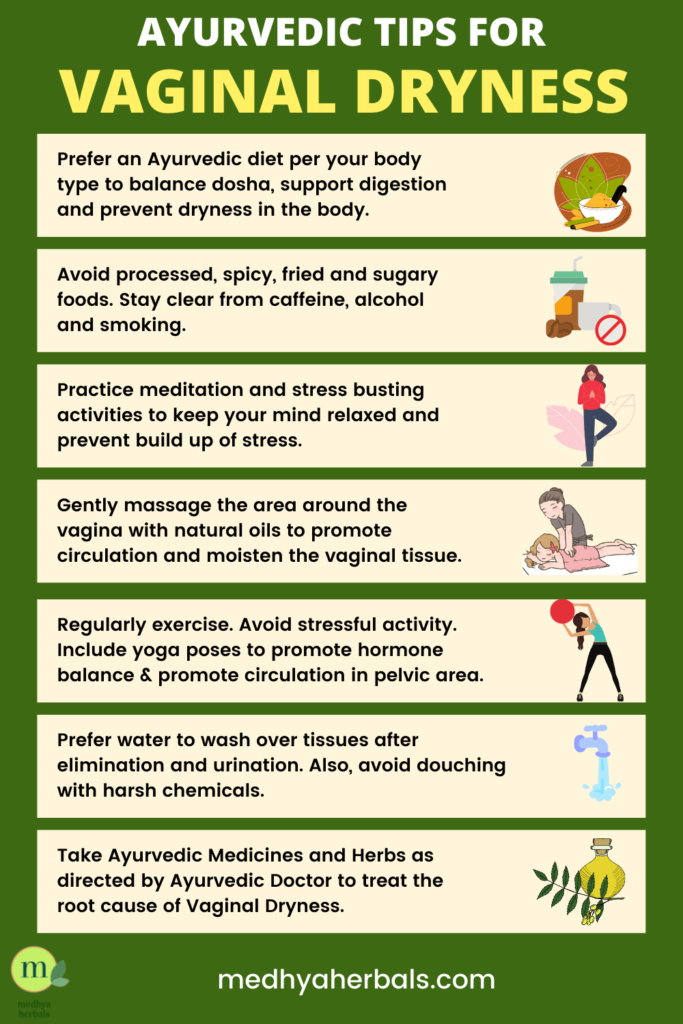
For vaginal dryness, some lifestyle changes that can be taken up are:
- Do not douche. Rather, clean with warm water and mild soap. Harsh soaps are ‘harsh’, and can be harmful.
- Maintain healthy ojas, that is, keep your immune system at optimal levels.
- Get active if you are not. Physical activity, specifically pelvic floor exercises boost blood circulation and improve the symptoms of vaginal dryness.
- Regular sexual stimulation or sexual intercourse helps increase blood flow to the area.
- Massage the area around the vagina with natural oils. This will improve circulation in the area and prevent the symptoms of vaginal dryness.
- Use good hygiene products. Avoid those with harsh chemicals.
- Increase lubrication of the vagina with natural and chemicals free moisturizers. You can also apply plain or medicated oils as ghee, sesame oil or coconut oil.
- Prefer to use water to wash after elimination and urination. Use of tissue aggravates pain and friction down there.
- Practice pranayama and relaxing activities to relieve stress and manage your health.
Best Diet and Foods to Prevent Dry and Itchy Vagina
- Foods containing phytoestrogens should be taken. They are a good source of natural estrogens. Phytoestrogens are simply estrogens from that are gotten from plants. Such plants that can be included are beans, lentils, seeds, nuts and soy sprouts.
- Consume juicy and sweet tasting fruits such as papaya, melons, cucumbers, pomegranate, apples and oranges.
- Sip on herbal teas made with shatavari, aloe vera, and licorice as recommended earlier.
- Stay hydrated at all times. This will naturally boost circulation and moisture in your body. Go for warm water, herbal teas or herbs infused water that you can prepare at home. About 8 cups of water daily is recommended for proper hydration.
Takeaway!
Vaginal Dryness occurs with age and changes in the hormonal balance of the body. The intensity and extent of the symptoms will depend on your specific health state.
As you saw, there are ample of natural remedies and solutions with which you can handle the cause and symptoms of vaginal dryness. So, first of all stop suffering in silence and adopt these natural measures.
Along with lifestyle changes and natural solutions, another key thing that will help you is better communication with your partner. Make him aware of your pain and together you can handle it well to protect your sanity and pleasure.
FAQ
1. How can I restore my vaginal lubrication naturally?
First, let’s start with some basics. The main function of vaginal lubrication is to reduce friction and protect the vagina from physical trauma during sexual intercourse. It also helps keep the environment in the vagina healthy.
There are many reasons why a woman might experience a decrease in vaginal lubrication. These include, but are not limited to, aging, stress, anxiety, medications, childbirth, and menopause.
Here are some natural lubricants that can be applied externally or taken internally to rejuvenate the vagina
- Natural oils as coconut oil, ghee (clarified butter), almond oil, and extra virgin olive oil
- Aloe vera gel
In addition, you should also practice a healthy diet & lifestyle to restore your vaginal lubrication naturally. Some of these methods include:
- eating a healthy diet
- exercising regularly
- managing stress and anxiety levels
- avoiding triggers that cause dryness such as hot baths or showers, caffeine, and alcohol
2. What is the treatment of internal dryness in Ayurveda?
The opposite of health is dryness – both literally and figuratively. When we think of dryness, we may think first of our skin or lips but did you know that there are different types of dryness?
There’s external dryness like when your skin or lips crack from lack of moisture and then there’s internal dryness which manifests as conditions like constipation, Irritable Bowel Syndrome (IBS), insomnia, anxiety and cracking of bones and joints.
Ayurveda prescribes a number of different treatments for internal dryness. The most common treatment is the use of herbal remedies, which are believed to help restore balance to the body.
Other Ayurvedic treatments for internal dryness include massage, yoga, and meditation. Ayurvedic practitioner may also recommend lifestyle changes, such as avoiding certain foods or taking up a new exercise routine. In most cases, Ayurvedic treatment is gentle and natural, and it is safe for most people to try.
3. What are the natural cures for female dryness?
As many women know all too well, dryness in the vaginal area can cause a wide range of unpleasant symptoms, including pain, itching, and burning sensations. While this condition is often treated with medications or hormonal supplements, there are also a number of natural remedies that can help to alleviate the symptoms of vaginal dryness.
Perhaps the most effective of these techniques is Ayurvedic treatment, an ancient approach to health that uses natural herbs and roots to stimulate circulation and improve overall health. Other Ayurvedic treatments for vaginal dryness include massages with medicated oil or intake of herbal teas, which work to soothe irritated skin and relieve tension in the pelvic region.
Additionally, dietary changes and yoga can provide relief by boosting circulation and promoting relaxation in stressed areas of the body.
Whatever your preferred Ayurvedic treatment may be, it’s clear that natural remedies are an effective way to address female dryness without introducing harsh chemicals into your system.
4. Who is prone to develop vaginal dryness symptoms?
- Aging
- Menopause: at menopause, there is lower levels of estrogen in the blood stream
- Cancer Treatment: treatments like chemotherapy, for example, can adversely affect hormonal balance in the body. Estrogen is also affected
- Pregnancy, child birth and breastfeeding are also associated with hormonal imbalances
- Medications like antihistamines cause vaginal dryness. Further, they can lead to complications that cause trouble with urinating.
- Antidepressants too lead to vaginal dryness, with more complications of decreased libido and difficulty in achieving orgasm.
- Surgical removal of ovaries (generally happens during hysterectomy). This is quite obvious because, after all, estrogen is produced in the ovaries. Removing the ovaries therefore means that the estrogen factory has been shut down.
- Douching is a practice that can lead to dehydration of the vagina also.
- Some women also complain of dryness in vaginal area if they have not been sexually active for some time.
- Hormonal Contraceptives also alter your natural hormone balance.
- Excess stress and anxiety
- Irregular Periods
- Excessive Exercise

